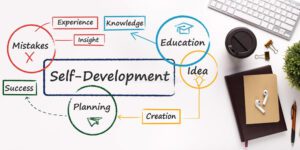Your resume is the first impression you make on potential employers. It's important to make sure it reflects your best qualities and highlights the skills that will set you apart from other job seekers.
A great way to do this is by selecting the right skills to showcase on your resume. Depending on the job you are applying for, certain skills might be more beneficial to include than others. In this blog post, we will discuss what makes a skill stand out, common skills employers look for, and how to highlight your strongest abilities in a resume.
Soft skills and hard skills
When it comes to skills, there are two general categories: hard skills and soft skills.
Hard skills are typically technical abilities – for example, coding languages or specific software programs – but can also include tangible experience like sales or management of a team.
Soft skills, on the other hand, are intangible interpersonal proficiencies like communication, problem-solving, or decision-making abilities.
Any successful candidate needs both types of abilities if they want to stand out from their competition in today's competitive job market.
Relevance – What skills are important for your desired job
The most important factor in choosing which of your qualifications should go on your resume is relevance: you want to focus on the ones that best match the requirements of the job posting as closely as possible. Start by making sure any necessary hard skills or certifications that were listed in the job posting are included so an employer can quickly tell if you qualify for the position without having to dig further into your experience section.
If those criteria have been met, you can move on to showcasing some of your soft skill accomplishments; These examples demonstrate how well-rounded you really are and boost candidacy in highly sought-after areas such as customer service and team collaboration.
Since not all roles require hard skill proficiency – especially those positions looking for candidates with less experience – soft skill descriptions become even more crucial since these present evidence of real-life experiences demonstrating aptitude in these areas. Examples might include contributions made during group projects or a time when critical thinking was put into practice in order to resolve an issue at work successfully.
For those focusing on a creative field like graphic design or web development, emphasizing achievements such as awards won can help capture an employer's attention more easily than merely listing technical expertise only found through certifications received at school or workshops attended elsewhere.
No matter what type of job you're applying for, carefully choose the language that accurately describes accomplishments while still sounding professional and concise. Employers don't want long paragraphs outlining every detail – bullet points serve better here – but they do want enough information so they know exactly what makes each applicant unique without wasting too much valuable time flipping through numerous resumes.
Making sure previous positions held and relevant courses taken also apparently doesn't hurt either since larger organizations often request proof of qualifications prior to offering an interview slot even if these weren't originally stated upon application submission initially either.
Everyone knows finding a great job is no easy feat. Tens, even hundreds of qualified individuals are all vying for a single position that can bring satisfaction and personal growth – it's up to you to make the most earnest effort in order stand out amongst the crowd.
The 7 Elements of A Resume
The seven elements of a skills-based resume are:
1. Summary of Qualifications
This section should provide a brief overview of your strongest qualifications and most impressive career accomplishments. It is an opportunity to highlight both hard and soft skills, as well as demonstrate how you meet the specific requirements of the job posting.
2. Core Competencies
Here, you should show employers that you have what it takes to succeed in their organization. Your core competencies should emphasize intangible skills that go beyond technical abilities like software programs or environmental certifications, such as interpersonal communication and problem-solving expertise.
3. Professional Experience
This section serves as a complete list of all previous positions held by the candidate with relevant responsibilities and projects undertaken while employed there listed underneath each entry. There should be a focus on roles that demonstrate leadership potential combined with hands-on experience or knowledge gained from past endeavors.
4. Educational Background
By listing any degrees obtained, even if they are outside of the field in which you're applying for a job, employers can quickly gain insight into your educational background and boost their chances of hiring you.
5. Technical Skills and Proficiencies
Technical skills are a highly desirable asset in many professions today, so detailing these proficiencies will help you stand out from other applicants. Highlighting your individual capabilities offers an advantage that others can't provide, increasing the value of your candidacy and giving you an edge over competitors for the same opportunity.
6. Certifications and Accreditations
Certifications showcase extraordinary proficiency that may not be evident through a resume alone, so it is essential to highlight these accomplishments and indicate their value when seeking employment. Such recognition is sure to make you stand out among other applicants.
7. Professional Affiliations and Awards
Highlighting the accolades you've earned gives readers a better comprehension of how your past successes relate to the duties they expect you to carry out in this job. This showcases why you're the best choice for them, considering that your prior efforts were praised so highly.
How to write your skills on a resume
When it comes to writing your skills on a resume, it’s important to be strategic and concise. Your skills section should be concise and easy to read, only listing the most applicable and relevant abilities you possess that directly relate to the job at hand.
To make sure your listed skills are as impactful as possible, aim to include quantifiable achievements or results whenever possible. Additionally, make sure that each skill is described in detail – for example, if you mention software proficiency, list out which software programs you are proficient in.
When describing your experiences related to any one of your listed skills, ensure that you provide all pertinent details such as tasks completed or challenges addressed during that time period. If you have managed a team before, note how large of a team size that was and what specific projects you oversaw within the team.
Each element of your resume is crucial, particularly when highlighting expertise in the Skills section. Leverage this valuable real estate by emphasizing any certifications or qualifications you may have that immediately demonstrate to employers and recruiters whether you are indeed suitable for their position.
When showcasing your skills, be sure to include details of any awards or accomplishments that demonstrate why you are the best choice for the job. By including this information, readers have a better understanding of how your previous successes can relate to the duties they need an employee to perform in their organization, providing extra assurance that you offer quality services effectively.
Lastly, always remember to include any intangible skills such as problem-solving or interpersonal communication. Soft skills like these can speak volumes about one's character traits and could be an invaluable asset to an employer in the long run! Strive to emphasize attributes that make you stand out from others vying for the same attention – your goal is to portray a unique value proposition worthy of receiving an invitation for an interview once completed; this ultimately increases your chances of getting employed at the desired position.
How many skills should you put on your resume?
The Skills section on your resume should be limited to no more than 8 – 10 points in order to maximize impact.
An effective Skills section should emphasize a few key skills that are particularly pertinent to the job you're applying for. Remember, if your list is too extensive it can be overwhelming and won't provide any worth to recruiters or hiring managers.
When constructing your resume, be calculative in deciding which abilities to include. Highlight those qualifications that are most relevant for the job at hand, instead of merely trying to list as many skills as you can think of. Before beginning this process, take a moment to thoroughly review the job description and mark any technical capabilities or experience employers are hunting for in an ideal candidate.
To identify the core competencies relevant for this job, reflect upon your professional experiences and pinpoint any valuable skills you have gained over time to support your candidacy. Furthermore, consider all certifications or qualifications that could be included in the Skills section of your resume which will reinforce how adeptly suited you are for this specific role.
To make your skills stand out, always articulate them with tangible results. Back up any claims about the abilities you have acquired through past experiences in the field by providing quantifiable outcomes that demonstrate how successful you have been at leveraging those capabilities.
For instance, even if my database proficiency was obtained solely from college courses, mentioning those skills I had perfected will provide the audience with a better understanding of the broad scope of information acquired outside of the classroom. This also hints at an ambitious personality that is willing to go the extra mile in ensuring their development in pertinent fields for furthering career opportunities and self-interests.
Always ensure that when you write down each skill, it is adequately described with compelling context and details surrounding the same. Don't just make a list of words in hopes they have enough weight alone; usually, this isn't the case since it gives only a brief glimpse instead of offering a complete picture to those who are interested so they can accurately understand your strengths. This will enable them to gauge its true value for themselves.
Must-have skills every employer is looking for
As you strive to create a noteworthy resume, remember that there are specific abilities employers search for when evaluating job applications. While certain talents can give you an advantage, some “must-have” skills should be included in any well-crafted resume if you want to make it through the first round of consideration.
To meet the demands of this position, candidates must possess advanced computer skills and exceptional communication capabilities (written and verbal,) demonstrate an aptitude for independently working as well as collaborating in groups; have a knack for problem-solving and astutely comprehending complex concepts.
Showcase your skills on your resume by providing concrete examples of how you have used those abilities in the past. If, for instance, you've worked collaboratively in teams before – make sure to mention the members involved and detail how their combined efforts achieved tangible results that benefited the company. This allows potential employers to get a clear picture of what kind of professional experiences you bring with you.
If you have a tech-savvy background, make sure to list the coding languages and software platforms that you are familiar with. Demonstrating your fluency in these areas will give potential employers an insight into what kind of value you can bring to their organization.
Furthermore, be sure to include quantifiable achievements from previous jobs in your interview process. Showing management how you can relate yourself and past successes to other roles will demonstrate a great deal of confidence as well as the skill sets necessary for success within the position being applied for.
Lastly, having insight into the industry trends and happenings already taking place in the company provides invaluable perspective. This helps to understand what is expected even two steps ahead of the competition, ensuring any gaps will be filled when it comes to expectations before being hired full-time.
Thank you for taking the time to read this blog post. Hopefully, it has provided you with some valuable insight into what special skills employers are looking for when reviewing job applications. We value our readers’ opinions, so please feel free to leave comments and share your experiences and tips with other readers.
We hope that you have found this article helpful in aiding your job search and identifying which special skills would be most beneficial to highlight on your resume. With the right preparation and knowledge, you can set yourself apart from the competition when applying for jobs and have a much better chance of success in landing your dream job. So don’t delay – start enhancing your resume today by highlighting those key skills.

















